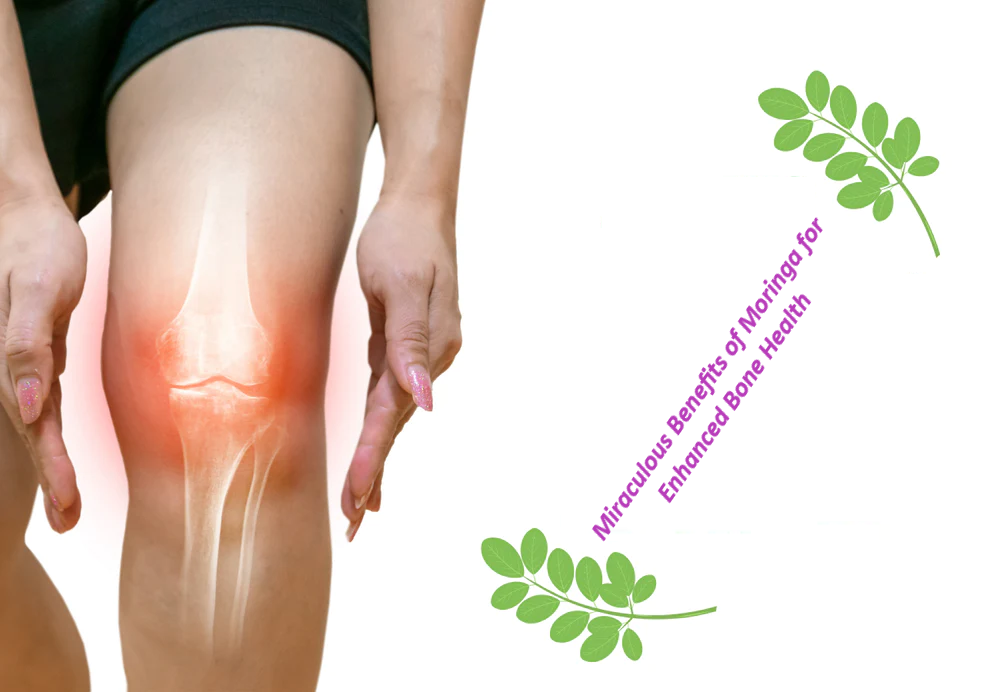Introduction to Bone Health: Understanding the Importance of Strong and Healthy Bones
Bone health is a crucial aspect of overall wellness, often overlooked until significant issues arise. Strong and healthy bones are foundational for mobility, stability, and a quality life, serving as the support system of our bodies. They also play a vital role in protecting organs, anchoring muscles, and storing calcium. As we age, maintaining bone health becomes increasingly important to prevent diseases such as osteoporosis, which leads to fragility and increased risk of fractures. This article explores the pivotal role of nutrition, especially the benefits of incorporating Moringa powder—a nutrient-dense superfood—into your diet for optimal bone support.
Nutritional Requirements for Bone Health: Essential Vitamins and Minerals
Bone health is supported by a balanced intake of specific nutrients, primarily calcium, vitamin D, magnesium, and phosphorus. These elements work synergistically to promote bone density, strength, and overall skeletal integrity. A deficiency in any of these nutrients can lead to weakened bones and an increased risk of osteoporosis and fractures.
Exploring Moringa Powder: A Nutrient-Dense Superfood for Bone Support
Moringa Oleifera, commonly known as Moringa, is celebrated for its remarkable nutritional profile. This superfood contains a plethora of vitamins, minerals, and antioxidants, making it an exceptional ally for bone health. Its leaves, when dried and powdered, offer an easy way to enrich your diet with bone-supporting nutrients.
Calcium Content in Moringa Powder: Enhancing Bone Density and Strength
Calcium plays a pivotal role in maintaining bone health, acting as the primary mineral in bones and teeth. Moringa powder emerges as a significant plant-based source of calcium, surpassing many traditional calcium sources in terms of quantity.
- Regular consumption of Moringa powder can help maintain and enhance bone density and strength, an essential aspect of health, especially critical as we age and our natural bone mass begins to decline.
- By integrating Moringa into the diet, individuals can support their skeletal system's integrity, potentially reducing the risk of developing conditions such as osteoporosis.
Vitamin D in Moringa: Facilitating Calcium Absorption for Optimal Bone Health
Although Moringa itself does not contain vitamin D, its high calcium content emphasizes the importance of vitamin D in ensuring maximum calcium absorption.
- Vitamin D is crucial for bone health because it facilitates the intestinal absorption of calcium, making the calcium in Moringa more effective.
- To optimize the bone health benefits of Moringa, it is recommended to include vitamin D-rich foods or supplements in your diet, ensuring that the calcium from Moringa is efficiently utilized by the body.
Magnesium in Moringa: Supporting Bone Formation and Structure
Magnesium's role in bone health is multifaceted, contributing not only to the structural development of bones but also to the conversion of vitamin D into its active form, necessary for calcium absorption.
- Moringa is a good source of magnesium, which aids in the formation and maintenance of bone structure.
- This essential mineral supports the biochemical reactions that generate bone tissue, underlining Moringa's value in a diet aimed at bolstering bone health.
Phosphorus in Moringa: Essential for Bone Mineralization and Strength
Phosphorus is another critical mineral for bone health, working in tandem with calcium to fortify bone strength and density.
- Moringa contains a significant amount of phosphorus, contributing to the process of bone mineralization and ensuring the bones' durability and resilience.
- The presence of phosphorus in Moringa complements its calcium content, making it an even more effective superfood for supporting skeletal health.
Moringa and Osteoporosis: Potential Benefits in Preventing Bone Loss
The rich nutrient profile of Moringa, especially its high levels of calcium and presence of antioxidants, positions it as a potential natural preventive measure against osteoporosis.
- Antioxidants in Moringa can neutralize free radicals, reducing oxidative stress which is a contributing factor to bone density loss.
- This antioxidant action, combined with Moringa's mineral content, suggests that regular consumption of Moringa could help in preventing the bone density reduction characteristic of osteoporosis, offering a natural strategy for maintaining bone health into old age.
Moringa and Bone Healing: Accelerating Recovery from Fractures and Injuries
The healing of bones after fractures and injuries is a complex process that requires a well-coordinated response involving the remodeling and regeneration of bone tissue. Nutrients play a crucial role in this process, with calcium and magnesium being particularly vital. These minerals are abundant in Moringa, making it an excellent dietary addition for those recovering from bone-related injuries.
-
Calcium is fundamental for bone regrowth, serving as the primary building block for new bone tissue. It aids in the formation of the bone matrix and is essential for the mineralization process that gives bones their strength and hardness.
-
Magnesium is equally important as it acts as a cofactor for enzymes involved in bone growth and influences the activity of osteoblasts and osteoclasts, cells responsible for forming and resorbing bone tissue, respectively. Magnesium also helps convert vitamin D into its active form, which is crucial for calcium absorption and bone health.
Incorporating Moringa into one's diet can be done through supplements, powders added to smoothies, soups, and other dishes, or even teas made from dried leaves. This not only supplies the body with essential minerals for bone healing but also provides a range of antioxidants that combat inflammation, potentially reducing recovery times and enhancing the overall healing process.
Moringa Leaf Extracts and Bone Health: Scientific Evidence and Clinical Studies
Recent scientific investigations and clinical studies have begun to uncover the positive effects of Moringa leaf extracts on bone health. These studies suggest that Moringa not only has the potential to enhance bone density but may also prevent bone loss associated with conditions like osteoporosis.
-
Research has shown that Moringa contains certain compounds that stimulate bone growth and regeneration. These include various polyphenols, vitamins, and minerals that work together to protect bone tissue from oxidative stress and inflammation, which can otherwise lead to bone degradation.
-
Clinical studies involving animal models have demonstrated that supplementation with Moringa extracts leads to improvements in bone density and strength. Although more research is needed to fully understand the implications for human health, these findings are promising and suggest that Moringa could be a valuable natural remedy for improving bone health and preventing bone-related diseases.
Moringa Powder in Bone Health Supplements: Formulations and Dosages
Given its rich nutrient profile and potential health benefits, Moringa powder is increasingly being included in bone health supplements. These supplements often combine Moringa with other vitamins and minerals, such as vitamin D and K2, which further support bone health.
-
Formulations typically vary, with some supplements focusing solely on Moringa's pure powdered leaves, while others incorporate extracts that concentrate specific beneficial compounds. The choice between these options depends on individual health goals and preferences.
-
Dosages of Moringa supplements can also vary widely. A general recommendation for Moringa powder is starting with a small dose, such as half a teaspoon per day, and gradually increasing to not more than two teaspoons daily to avoid possible digestive discomfort. However, the optimal dosage for bone health specifically may depend on the concentration of the active ingredients in the supplement and the individual's overall nutrient intake and health status.
As with any supplement, it's crucial to consult with a healthcare professional before adding Moringa to your diet, especially for those with existing health conditions or who are taking other medications. A healthcare provider can offer personalized advice and ensure that Moringa supplements are safe and beneficial for your specific health needs and conditions.
Conclusion
Moringa powder emerges as a miraculous superfood with profound benefits for bone health. Its rich composition of essential vitamins, minerals, and antioxidants makes it an invaluable addition to the diet of anyone looking to support their skeletal system naturally. By integrating Moringa into your daily regimen, you not only contribute to the strength and vitality of your bones but also embrace a holistic approach to wellness. Remember, the journey to optimal bone health is a combined effort of nutrition, lifestyle, and informed choices, with Moringa powder standing out as a key ally in this endeavor.

